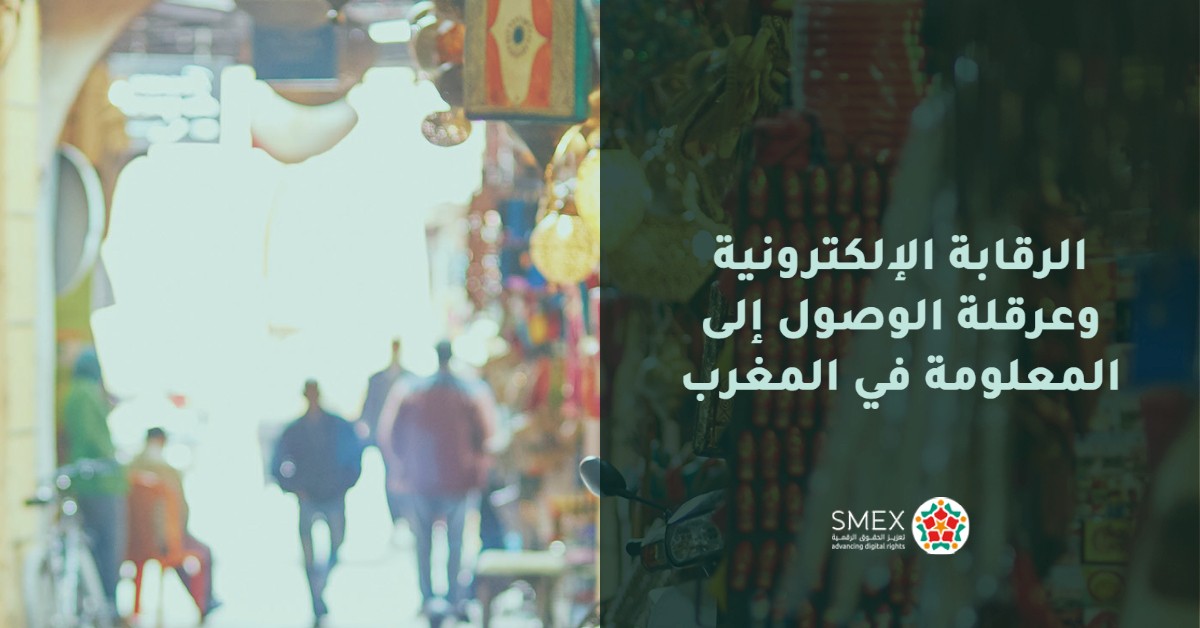Moroccan investigative journalist Omar Radi’s phone was hacked using Pegasus spyware in June 2020, after he uncovered the “Servants of the State” scandal. Radi had revealed that nearly 100 Moroccan public officials acquired residential properties on state lands at a fraction of their true cost. In March this year, Radi was sentenced to six years in prison on charges of “espionage” and “rape.”
Prior to the sentencing, and only a few days after Radi published his findings about the scandal, the government cadastre website, where Radi obtained his information, was shut down. The website was later relaunched, albeit with new restrictions on the right to access cadastre records directly or through the website, as only property owners or legally authorized persons could now obtain information and data.
Restrictions to the Right to Access Information
Moroccan authorities control which information is published and disseminated about the different ministries and state administrations. According to Ahmed Bernoussi, Secretary-General of Transparency International Morocco, the authorities “deliberately refuse to publish this information on the government’s official websites so as to conceal any leads related to the embezzlement and corruption in some government sectors.”
The Moroccan Law on the Right to Access to Information was issued in February 2018 and entered into force in March 2020. However, Bernoussi told SMEX that this law has “fundamental flaws” for several reasons, primarily “the unjustified restrictions in Article 7, which exclude ‘any information related to national defence or the state’s internal and external security.’”
He explained that “the latter can be interpreted by the government according to its interests and whims. Moreover, Article 29 allows for the criminal prosecution of any person who uses or re-uses official information to ‘undermine public interest.’”
Despite the many restrictions, the Law on the Right to Access to Information “is not implemented even with its drawbacks,” according to Bernoussi. For instance, Article 10 requires all government institutions to publish the information in their possession – excluding those mentioned in the ‘exceptions’ section – via all electronic dissemination platforms.
However, several institutions fail to abide by this requirement, such as the Ministry of Health, which did not publish any information on its website regarding the public contracts it had signed with private companies during the COVID-19 emergency measures. This prompted Transparency International and the Moroccan Association for Human Rights (AMDH) to file a lawsuit against the Ministry of Health.
Other government institutions do not have websites in the first place, such as the Ministry of Interior, which only operates a website for one of its affiliates, the Directorate-General of Territorial Communities.
Access to Information and Freedom of Expression Dilemma
The exceptions and restrictions imposed by the Law on Access to Information are not the only obstructions facing journalists and researchers, as many of them “lack the technical expertise to access the information and data available online, because this requires intensive research,” according to journalist and data journalism expert Salaheddine Lemaizi. In an interview with SMEX, Lemaizi said that “self-censorship plays a crucial role in preventing many journalists from pursuing topics related to the security and military sectors and from questioning the royal regime.”
Mohamed El-Aouni, the former coordinator of the Moroccan Network for the Right to Access Information and the current president of the Organization for the Freedom of Media and Expression, believes that the exercise of the “right to access information essentially depends on the freedom of opinion and expression.”
In order to avoid a confrontation with the authorities, El-Aouni explains that “journalists or authors may refrain from publishing some of the sensitive information at their disposal related to political issues.” Unfortunately, many journalists in Morocco fear being subjected to pressure and harassment, which could culminate in judicial prosecution or imprisonment.
According to Bernoussi, the genuine respect of the freedom of opinion, expression, and the press is what truly guarantees the right to access information, “which is not the case in Morocco.” While Moroccan authorities claim that they are abiding by the Law on Access to Information, “they also detain journalists who uncover political and economic corruption and prosecute some of them to create an environment of intimidation.”
Journalists Charged with Publishing “Accurate Information”
In December 2019, the Rabat Court of Appeal issued a suspended sentence of six months in prison and imposed a fine of MAD 10,000 (approximately USD 1,000) on the charge of publishing “accurate information” against four journalists who published extracts from a leaked report by the House of Councillors’ Fact-finding Commission on the bankruptcy of the Moroccan Retirement Fund.
A similar incident occurred when the Akhbar Alyoum Newspaper, which is no longer in circulation, issued a report on June 13, 2012, revealing illegal financial bonuses given by the former Minister of Finance Salaheddine Mezouar to Noureddine Bensouda, Treasurer-General of the Kingdom. Rather than open an administrative or judicial investigation into the illegal bonuses uncovered by the newspaper, the judiciary accused two Ministry of Finance employees of “leaking documents” instead. The court acquitted one of them and issued a suspended sentence of two months in prison against the other.
Civil society organizations are still demanding that the restrictions imposed on the right to access information be lifted, by calling for the issuance of a new law. Meanwhile, journalists, bloggers, and whistle-blowers continue to challenge the restrictions limiting their right to access information and expose corruption, despite the difficulties and risks that they face, particularly prosecution and imprisonment.
According to El-Aouni, however, the rampant political, economic, and administrative corruption in Morocco will eventually succumb to “the persistence of citizens and journalists in claiming and practicing their right to access information, despite the harassment and intimidations they might face.”



